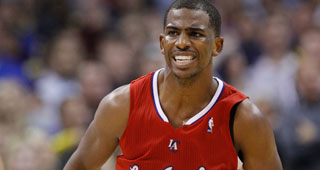Over the last few years, there have been some interesting discussions about the value of point guards in the NBA. A group of people look to the generally poor quality of point guards on championship teams and opine that this means the position is overvalued.
While this argument holds some inherent logic and some pretty clear results in recent seasons, I think this observation muddies the water concerning the importance of lead guards in a way that proves counterproductive. Teams that win championships do so overwhelmingly on the backs of the best of the best, which is why the last non-Pistons team to win a title without a player who had already won an MVP award was the 1981 Boston Celtics. Since so few PG’s win the Most Valuable Player award, it would follow that titles would be hard to come by for the elites.
The problem with all of these points is that they focus too heavily on the big brass ring (or gold ring, in this case) instead of the overall picture. My vision of the value of elite point guards is that they do more to ensure regular season success than any other position, but end up losing out to the game-changing bigs and swingmen in the playoffs. Considering the general paucity of MVP players in the league and the even smaller group of them that are accessible through trades and free agency to most teams, high-level point guards make sense as a logical step to making sure your team stays relevant as they work to acquire these super elite talents. Interestingly, we have seen a wide variety of top end point guard talent get traded in the last few years (Chris Paul and Deron Williams most recently).
On Sunday, I had the privilege to watch two of the absolute best in the business right now show why they are so important to their teams, particularly in the regular season.
Chris Paul has been the maestro for the Los Angeles Clippers since he hit town after that whirlwind of trade nonsense before the start of the 2011-12 season. He has operated in numerous functions during that year-plus, including seemingly player-coach and lead free agent recruiter. This season, Paul has already missed 12 games and the Clippers are an even 6-6 in those tilts. They have been 31-11 with him on the court, meaning a difference of .238 in winning percentage. When considering that the team has not exactly had it easy in terms of injuries to other players, that kind of discrepancy stands out. In the game against the Knicks, Paul did an incredible job of punishing the Knicks for their defensive lapses either by his own buckets or by hitting the open man for makeable looks. In fact, the Clippers are seventh in offensive efficiency despite missing their star for one-fifth of the season and possessing a bottom five free throw shooting squad thus far.
Heck, the Clippers’ success thus far seems even more impressive given the ineptitude of their head coach. For example, before Sunday’s game Vinny Del Negro expressed an understanding that having a fully healthy roster would limit the minutes and opportunities for a variety of players. This makes sense. However, it stood out as befuddling when one of the most pivotal players in the second half of that game, Grant Hill, ended up with 15 impactful minutes because he did not play one second in the first half of the game. Despite a mounting series of strange decisions by his head coach, Paul gives the Clippers the ability to rise above and host at least one playoff series.
In the second Sunday game I covered, Tony Parker simply eviscerated the Brooklyn Nets in one of the most astonishing performances I have ever seen in person. Gregg Popovic talked before and after the game about how remarkably well his point guard had been performing and acknowledged that having Tim Duncan and Manu Ginobili out helped give Parker the spotlight he more regularly deserves. Even without starters that can create their own offense, Parker managed to keep everyone involved while also forcing the defense to handle his scoring with 29 points on 12-for-21 shooting. What’s more, he assisted on 11 baskets without a single turnover. In total, Parker managed to have a hand in more than half of the team’s baskets despite playing less than five minutes in the fourth quarter. While some may try to give credit to the excellent system, what Parker has been able to do without a full complement of players has been nothing less than awe-inspiring so far this season. After the game, Popovic talked about how Parker should be in the group of players talked about for the MVP and while I would not go so far as to include him in that echelon since his defense stands out as a flaw, his remarkable season deserves plenty of note and adulation.
While some may talk about how point guards cannot be the best player on title teams, that narrow-mindedness could cause them to miss out on some of the most impactful performances the league sees on both a game-by-game and season-by-season basis. Those concepts may not see themselves represented any more vividly than by Chris Paul and Tony Parker.



